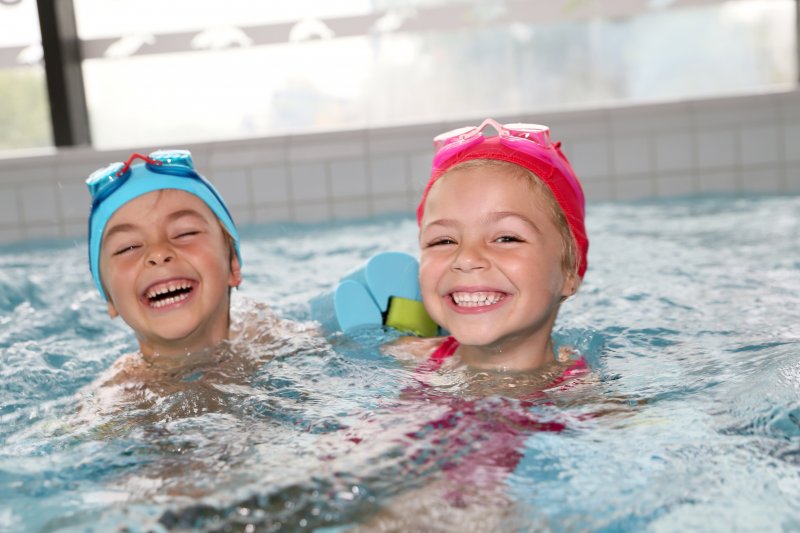
Summer is quickly approaching, and as the temperatures rise, more and more parents and their children will take to swimming pools to cool off. Although fun and enjoyable for people of all ages, you may not realize that chlorine can become problematic for oral health. So, is swimming bad for your child’s teeth? Here are four potential risks to your little one’s smile and what you can do to protect it.
Facial Injuries
If your child enjoys playing games while swimming, you’ll want to be extra mindful while sitting on the sidelines or engaging in play. Without proper eye protection (i.e., goggles), your child may be unaware of their surroundings and accidentally swim into the side of the pool. This can lead to tooth injuries that require an immediate trip to the emergency dentist’s office. To prevent this from happening, make sure to talk to your child’s pediatric dentist about the possibility of a customized mouthguard.
Damage to Dental Appliances
If your child or teen wears a retainer, you’ll want to make sure they remove it before diving into a pool. Why? Because these appliances are not designed to combine with chlorinated water. Not only can they accidentally lose the device, but it can also become damaged as a result of the pool’s chemicals. This means that you’ll be required to spend more money to have it replaced, and your child will need an additional appointment to come in and receive their new appliance.
Before allowing them to run and jump into the pool, make sure they take out their retainer and place it in a protective case.
Weakening Tooth Enamel
Chlorine is necessary to rid swimming pools of bacteria; however, when teeth are exposed for too long, the enamel (the outermost layer) can become weak. This typically occurs because the pH level is too low, which can result in tooth enamel eroding and causing stains to form on your child’s teeth. You can gauge fairly easily whether the pH levels are too low simply by smelling the water. If it burns when you breathe in, suggest that your child get out. You can also attempt to have your child keep their mouth closed as much as possible while in the pool, but that is often difficult for kids to remember.
Increased Tooth Sensitivity
If you have a pool at home, you can better monitor and gauge the chlorine levels; however, if you visit a public or friend’s pool, you may not think about the potential dangers. Along with weakened, corroded enamel that comes from a low pH level, teeth can also become increasingly sensitive when exposed to pool chemicals for too long. This will make it painful and difficult to consume hot or cold beverages and foods, which may be disappointing for many children who enjoy ice cream and popsicles during the summer months.
Taking stock of the pool and the areas around it before allowing your child to swim will help to better protect their teeth and keep their smiles healthy throughout the summer.
About the Author
At Brush Pediatric Dentistry, Dr. Mira Albert leads a team of pediatric dentists who make it possible for little ones to achieve healthier smiles. Offering a fun and exciting environment filled with kid-friendly amenities, we believe in helping children become enthusiastic about oral hygiene while keeping parents informed of ways they can work to improve and help their children maintain healthier teeth and gums at home. If you are looking for tips or suggestions to protect your child’s smile this summer, contact us at (630) 504-2223.
